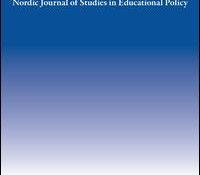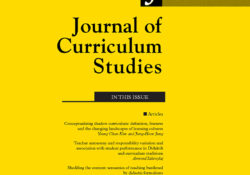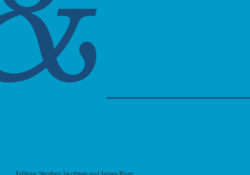tandfonline.com har udgivet en rapport under søgningen “Teacher Education Mathematics”: ABSTRACT ABSTRACT Attentiveness is a crucial aspect in the practice of teaching. As teaching always is teaching about something, ideas, values, events, or objects, it both draws and forms the attention of the students. When contemplating on and looking into the term “attention”, it is apparent that it is not at all, a clear and well-defined concept. Acknowledging the relational aspects of teaching and its role in the formation of attention, the article seeks to turn away from psychologically, behaviorally, and cognitively based (or biased) perspectives that frame attention as either an individual capacity of the student or an expected student behavior in the classroom (Rytzler 2017). It also seeks to contribute to discussions of philosophy of education, where questions… Continue Reading →
Like this:
Like Loading...
tandfonline.com har udgivet en rapport under søgningen “Teacher Education Mathematics”: ABSTRACT ABSTRACT This article investigates multidisciplinary teaching practices through models of General Didactics. Multidisciplinary education is gaining interest on international and national levels through policy reforms. Research on multidisciplinary teaching practices is often descriptive and there is a lack of theories to support teachers. General Didactics on the other hand builds on a long tradition of models and concepts (e.g., content, aims, and methods) relevant for the autonomous teacher who reflects on how to structure and execute the teaching practice. The didactic models of Wolfgang Klafki and Wolfgang Schulz were used when analysing two cases of multidisciplinary teaching in two Finnish primary schools. The question addressed is in what ways General Didactic principles, as defined by Klafki and Schulz, can… Continue Reading →
Like this:
Like Loading...
tandfonline.com har udgivet en rapport under søgningen “Teacher Education Mathematics”: ABSTRACT Formulae display:?Mathematical formulae have been encoded as MathML and are displayed in this HTML version using MathJax in order to improve their display. Uncheck the box to turn MathJax off. This feature requires Javascript. Click on a formula to zoom. ABSTRACT Teacher education is of vital importance for what teachers are capable to do for their pupils, but little is known about student teachers’ pedagogical knowledge. The Didaktik and the curriculum traditions are two main education approaches underpinning formal schooling and teacher education programmes (TEPs) in the Western world. The main difference between the two traditions lies in the content and objectives of teacher education, which are either theoretical or action-oriented. Two questions are addressed quantitatively: How do teacher… Continue Reading →
Like this:
Like Loading...

tandfonline.com har udgivet en rapport under søgningen “Teacher Education Mathematics”: ABSTRACT ABSTRACT Reconciling broad educational goals of job-readiness with specific work task-related qualifications or competences poses challenges for vocational teachers. To assist efforts to address these challenges, this article explores knowledge practices of project-based vocational instruction in Swedish upper secondary vocational education and training, particularly how the teacher´s intentionality (expressed through choice of a target) responds to needs to develop integrative knowledge. Two specific research questions are addressed, using a conceptual framework incorporating Didaktik and Legitimation Code Theory. First, how do vocational teachers in this setting repurpose vocational knowledge during project work? Second, what educational goals do they target during project work? Secondary analysis of participant observation data indicates that fragmentation of occupation-specific knowledge into disparate work processes and work… Continue Reading →
Like this:
Like Loading...
tandfonline.com har udgivet en rapport under søgningen “Teacher Education Mathematics”: ABSTRACT ABSTRACT What can educators working to develop critical thinking (CT) in their classrooms gain from engaging with the German/Scandinavian tradition of Bildung-centred Didaktik? This article takes up the challenge of how to develop an epistemology of CT that is relational and contextual and gives students the possibility of engaging in ethical debates about social justice, as called for by critical pedagogues such as Lim (2011, 2015). The backdrop is an increasing focus on CT as a prominent educational goal in the Organisation for Economic Co-operation and Development and beyond, a development that makes it important to clarify the epistemological basis for how CT can be developed in schools and the ethical foundations and implications of the different approaches in… Continue Reading →
Like this:
Like Loading...
tandfonline.com har udgivet en rapport under søgningen “Teacher Education Mathematics”: ABSTRACT ABSTRACT This article builds upon the international dialogue around ‘curriculum crisis’ initiated by Michael Young in Journal of Curriculum Studies (JCS) in 2013 and followed up in JCS in 2015. It seeks to expand the dialogue in three avenues. First, when considered from a sociological perspective, Young is correct to declare ‘curriculum crisis’; however, his position is limited only to the conflict theory. Second, from educational perspectives, the curriculum crisis as such is self-inflicted and it has been more of a battle among different curriculum ideologies in the Anglo-Saxon world and resistance to Bildung-centred Didaktik tradition in the Western world more broadly. Third, it points to the fourth industrial revolution as an inevitable phase. It concludes that ‘curriculum crisis’… Continue Reading →
Like this:
Like Loading...
tandfonline.com har udgivet en rapport under søgningen “Teacher Education Mathematics”: ABSTRACT Formulae display:?Mathematical formulae have been encoded as MathML and are displayed in this HTML version using MathJax in order to improve their display. Uncheck the box to turn MathJax off. This feature requires Javascript. Click on a formula to zoom. ABSTRACT The primary objective of the study was to empirically test theoretical claims made about differences between Didaktik and curriculum traditions concerning teacher autonomy (TA) and teacher responsibility (TR). It tests the hypothesis that TA and TR are higher among Didaktik than curriculum countries. The second objective was to explore associations of TA and responsibility measures with students’ science performance? Nationally representative data from 2009 Programme for International Student Assessment (PISA), collected through a two-step random selection process were… Continue Reading →
Like this:
Like Loading...
tandfonline.com har udgivet en rapport under søgningen “Teacher Education Mathematics”: ABSTRACT ABSTRACT Recent neoliberal policies and societal trends point toward new and perennial tensions for nation-state education, including curriculum/Didaktik and leadership thereof. These challenges affect governance/leadership and curriculum with changes in aims and values together in ways that demand coherence, yet the traditionally disparate fields of educational leadership and curriculum/Didtakik have developed separately in terms of approaches to theory and theorizing that have informed empirical studies over time. This article draws upon an analysis of theory/theorizing in these fields, as well as modern education theory and its core concepts, and discursive institutionalism to frame this issue and a larger project. Link til kilde
Like this:
Like Loading...







